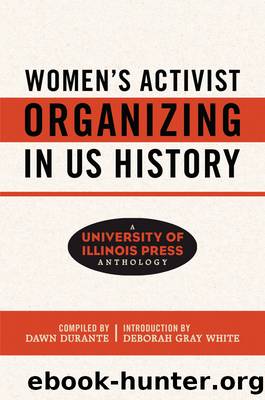Women's Activist Organizing in US History by unknow

Author:unknow
Language: eng
Format: epub
Publisher: University of Illinois Press
Published: 2022-01-15T00:00:00+00:00
Notes
1. Rosalyn Terborg-Penn, African American Women in the Struggle for the Vote, 1850â1920 (Bloomington: Indiana University Press, 1998), 31â106.
2. Ibid., 31â80.
3. Colored American, February 17, 1900.
4. Mary Church Terrell, âThe Progress of Colored Women,â speech to the National American Woman Suffrage Association Convention, Washington, D.C., February 18, 1898. Available at http://antislavery.eserver.org/legacies/the-progress-of-colored-women; Anna Julia Cooper, Voice from the South (London: Oxford University Press, 1990).
5. Terborg-Penn, African American Women, 51â80.
6. Kate Masur, An Example for All the Land: Emancipation and the Struggle over Equality in Washington, D.C. (Chapel Hill, NC: University of North Carolina Press, 2012), 127â73. Masur discusses at length the complicated terrain of suffrage activism in the nationâs capital.
7. Elsa Barkley Brown, âTo Catch the Vision of Freedom: Reconstructing Southern Black Womenâs Political History, 1865â1880.â In Gordon, Collier-Thomas, Bracey, Avakian, and Berkman, African American Women and the Vote, 66â99.
8. Ibid., 86â87.
9. Ann D. Gordon, Bettye Collier-Thomas, John H. Bracey, Arlene V. Avakian, and Joyce A. Berkman, eds. African American Women and the Vote, 1837â1965 (Boston: University of Massachusetts Press, 1997); Terborg-Penn, African American Women; Gerda Lerner, Black Women in White America: A Documentary History (New York: Vintage, 1997); Deborah Gray White, Too Heavy a Load: Black Women in Defense of Themselves, 1894â1994 (New York: Norton, 1999); Marjorie Spruill Wheeler, One Woman, One Vote: Rediscovering the Womenâs Suffrage Movement (Troutdale, Ore.: NewSage Press, 1995); Lisa G. Materson, For the Freedom of Her Race: Black Women and Electoral Politics in Illinois, 1877â1932 (Chapel Hill: University of North Carolina Press, 2009).
10. Terborg-Penn, African American Women, 4â7.
11. African American Women and the Vote, 1837â1965 (Gordon, Collier-Thomas, Bracey, Avakian, and Berkman, eds.) loosely periodizes African American womenâs suffrage activism. Two of the periods framed by the editors of this collection and in the extant scholarship on black womenâs suffrage activism are 1870â1896 and 1896â1935. These years are central to my temporal conceptualization of the New Negro era.
12. Darlene Clark Hine and Kathleen Thompson, A Shining Thread of Hope: The History of Black Women in America (New York: Broadway, 1998), 29.
13. Alexander Keyssar, The Right to Vote: The Contested History of Democracy in the United States (New York: Basic, 2009), 2.
14. Dred Scott v. Sandford, 60 U.S. 393, 573 (1856), Justice Benjamin R. Curtis, dissenting.
15. John Hancock, Essays on the Elective Franchise; or, Who Has the Right to Vote? (Philadelphia: Merrihew, 1865), 23.
16. Keyssar, Right to Vote, 2.
17. Leon E. Litwack, âThe Emancipation of the Negro Abolitionist,â in African-American Activism Before the Civil War, edited by Patrick Rael (New York: Routledge, 2008).
18. âThe Second United States Census,â 1800. See https://www.archives.gov/research/census/african-american/slavery-in-dc-1800â1860.pdf.
19. Ibid.
20. Daniel A. Payne, A History of the African Methodist Episcopal Church (Chapel Hill: University of North Carolina Press, 2001).
21. Letitia W. Brown, Free Negroes in the District of Columbia, 1790â1846 (New York: Oxford University Press, 1972).
22. Dorothy Sterling, ed., Turning the World Upside Down: The Anti-Slavery Convention of American Women, Held in New York City, May 9â12, 1837 (New York: Coalition of Publishers for Employment, 1987), 12.
23. Ibid.
24. Ibid.
25. Carol Faulkner, Womenâs Radical Reconstruction: The
Download
This site does not store any files on its server. We only index and link to content provided by other sites. Please contact the content providers to delete copyright contents if any and email us, we'll remove relevant links or contents immediately.
The Lost Art of Listening by Michael P. Nichols(6485)
Why I Am Not A Calvinist by Dr. Peter S. Ruckman(3773)
The Rosicrucians by Christopher McIntosh(3058)
Wicca: a guide for the solitary practitioner by Scott Cunningham(2711)
Signature in the Cell: DNA and the Evidence for Intelligent Design by Stephen C. Meyer(2506)
Real Sex by Lauren F. Winner(2481)
The Holy Spirit by Billy Graham(2427)
To Light a Sacred Flame by Silver RavenWolf(2357)
The End of Faith by Sam Harris(2296)
The Gnostic Gospels by Pagels Elaine(2034)
Nine Parts of Desire by Geraldine Brooks(2011)
Waking Up by Sam Harris(1962)
Heavens on Earth by Michael Shermer(1959)
Devil, The by Almond Philip C(1906)
Jesus by Paul Johnson(1892)
The God delusion by Richard Dawkins(1856)
Kundalini by Gopi Krishna(1827)
Chosen by God by R. C. Sproul(1766)
The Nature of Consciousness by Rupert Spira(1692)
